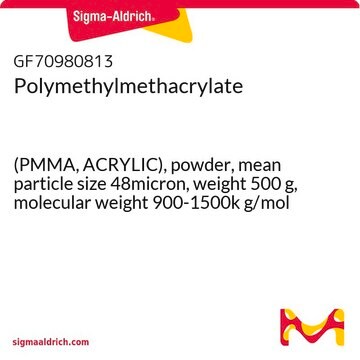445746
Poly(methyl methacrylate)
average Mw ~350,000 by GPC
Synonym(s):
PMMA, Poly(methacrylic acid methyl ester)
About This Item
Recommended Products
form
powder
Quality Level
autoignition temp.
580 °F
mol wt
average Mw ~350,000 by GPC
reduced viscosity
150-160 cm3/g(20 °C)(lit.)
acid number
<1 mg KOH/g
transition temp
Tg (DSC) 105 °C (midpoint)
solubility
alcohols and aliphatic hydrocarbons: insoluble
esters, ketones, aromatics and glycol ethers: soluble
density
1.17 g/mL at 25 °C
InChI
1S/C5H9O2/c1-4(2)5(6)7-3/h1-3H3
InChI key
PMAMJWJDBDSDHV-UHFFFAOYSA-N
Looking for similar products? Visit Product Comparison Guide
General description
Application
Features and Benefits
Storage Class Code
11 - Combustible Solids
WGK
nwg
Personal Protective Equipment
Certificates of Analysis (COA)
Search for Certificates of Analysis (COA) by entering the products Lot/Batch Number. Lot and Batch Numbers can be found on a product’s label following the words ‘Lot’ or ‘Batch’.
Already Own This Product?
Find documentation for the products that you have recently purchased in the Document Library.
Customers Also Viewed
Articles
Professor Aran discusses engineering graphene-based materials through careful functionalization, enabling diverse applications.
Self-healing soft electronic materials enable autonomous repair, reducing waste and costs in electronic devices.
Fluorescence quenching microscopy visualizes 2D materials like graphene and MoS2 rapidly, inexpensively, and with high fidelity.
Our team of scientists has experience in all areas of research including Life Science, Material Science, Chemical Synthesis, Chromatography, Analytical and many others.
Contact Technical Service






